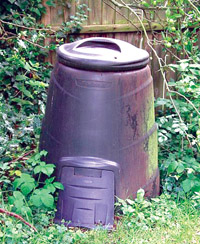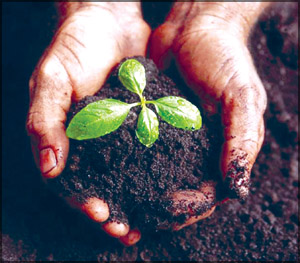Home composting made easier
These days, we are all concerned about the garbage problem; whether
it is related to getting rid of the garbage from our houses or those
huge mountains of garbage we see outside.
|

A compost bin |
|

Compost is rich in nutrients |
Of course, you may not be able to do much about the piles of garbage
dotting the country, but you sure can do something about the garbage
emanating(originating) from your own house.
Did you know that you could actually make use of some of your garbage
such as kitchen waste? This could be done by turning the waste from your
kitchen including leftover food and vegetable peelings into compost.
This may sound complicated, but children like you could definitely do
this with a little help from the grown-ups.
* First of all, you would need a compost bin. The local authority
could be contacted about this as there are certain areas where the local
authorities provide special compost bins to the residents at special
rates, as part of an organised garbage disposal service. If not, compost
bins are avaiable at supermarkets and garden centres too.
* Start off your compost heap with a thick layer of coarse woody
twigs and prunings mixed with weeds and plant trimmings.
* To get the best compost, you should ensure that you put the right
material into the bin. It will work better if it is a mixture of things
such as garden waste including old plants, flowers and grass cuttings;
old leaves, twigs and soft tree branches; kitchen waste such as fruit
and vegetable peels, tea bags and leaves; and eggshells. A little bit of
shredded paper and straw too could be added to this mixture.
* Add the odd bit of well-rotted cow dung also to the bin.
* Add compostable/biodegradable packaging from fruits and vegetables
bought from the supermarkets as well.
* Do not put pet waste, coal or ash, meat or fish, cooked food, the
roots of weeds, metal, glass or plastc in the bin.
* Keeping the heap slightly wet without allowing it to dry out will
aid the composting process. Sprinkle it with a little water every now
and then.
* The bin should be kept slightly warm too without letting it go
cold, as this will quicken the rotting process. Although the right
climatic conditions for this process exist in most parts of Sri Lanka,
in cold areas, this process could be aided by keeping the bin covered in
old blankets or sacks.
* Turn the heap around with a shovel or fork once every couple of
weeks so that it is well oxygenated.
* After some months, you would find dark brown, crumbly, soil-like
manure in the bin. This could be used as fertiliser in your garden,
which will lead to a rich cultivation.
This is also the most environmental-friendly way to dispose of
kitchen waste as it reduces the amount of garbage that would otherwise
have been dumped on roadsides or landfills. |
